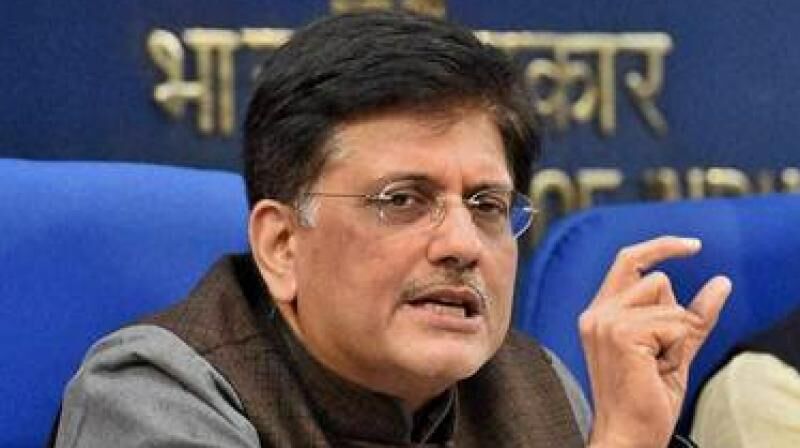We are studying work of MMTC, STC, PEC: Goyal

Beijing: As millions of Shanghai residents line up for coronavirus tests in the closed-down metropolis, authorities are promising tax cuts for shopkeepers and to keep its busy port functioning to limit disruptions to industry and trade.
This week's shutdown of most activities in China's most populous city to contain virus outbreaks jolted financial markets already on edge about Russia's war on Ukraine, higher U.S. interest rates and a Chinese economic slowdown.
The ruling Communist Party is trying to fine-tune its zero tolerance pandemic strategy to rein in job losses and other costs to the world's second-largest economy.
The Shanghai government has announced tax refunds, cuts in rent and low-cost loans for small businesses. A government statement Tuesday promised to stabilize jobs and optimize the business environment.
At the Shanghai port, the world's busiest, operations were normal and managers made extra efforts to ensure vessels can call normally, state TV reported. The port serves the Yangtze River Delta, one of the world's busiest manufacturing regions with makers of smartphones, auto components and other goods.
Operations at Shanghai airports and train stations were normal, according to the online news outlet The Paper. Bus service into and out of the city of 26 million was suspended earlier. Visitors are required to show a negative virus test.
Abroad, the biggest potential impact on China's Asian neighbors and the rest of the world is likely to come from developments that chill demand in the world's most populous consumer market, economists said.
China is the biggest trading partner for all of its neighbors, including Japan and South Korea.
Economic growth already was forecast to decline from last year's 8.1% due to a government campaign to cut corporate debt and other challenges unrelated to the pandemic. The ruling party's official target is 5.5%, but forecasters say even that looks hard to reach and will require stimulus spending.
From oil and coal to electronics components and consumer goods, China is a huge market for most industries.
China is the biggest single consumer of practically everything. It matters outside China, said Rob Carnell, chief Asia economist for ING. If China's consumption is getting knocked down by COVID, it is going to be something that filters down the supply chain and affects countries in the region.
Louis Kuijs, chief Asia-Pacific economist for S&P Global Ratings said Chinese officials are trying to ensure goods get to customers and protect supply chains. He noted that after previous shutdowns, factories caught up with orders by working overtime.
Despite fears that lockdowns in China will slow the recovery from last year's global supply chain problems, The impact on supply chains is not as big as many outside observers fear, Kuijs said. These restrictions tend to have a larger impact on spending and the demand side in China.
Still, the impact on Shanghai should be relatively muted if the city contains its outbreak as well as the southern business center of Shenzhen did earlier, said Carnell.
Shenzhen, a tech and finance center of 17.5 million people, imposed a similar citywide shutdown in mid-March and reopened a week later.
Employees of financial industries can work from home, while automakers and other big manufacturers can have workers live at factories in a closed loop system isolating them from contact with the outside.
General Motors Co. and Volkswagen AG said their factories in Shanghai were operating normally. GM said in an email it was carrying out contingency plans on a global basis with suppliers to reduce COVID-related uncertainties.
In China's northeast, BMW Group said factories of its joint venture with state-owned Brilliance Auto in the city of Changchun suspended production March 24 following an outbreak there.
Thousands of stock traders and other finance employees were sleeping in their offices to avoid contact with outsiders, the newspaper Daily Economic News reported. It said the Shanghai Stock Exchange was functioning normally with a reduced staff in a closed office."
The benchmark Shanghai Composite index was up 1.3% early Wednesday. Most other regional markets also advanced.
Nearby, the riverfront Bund, Shanghai's most famous vista, was quiet and empty of its usual crowds of pedestrians.
Most restaurants were only allowed to server diners who ordered via mobile phone and waited outside to collect meals. Visitors to shopping malls were required to wear masks and register using a smartphone app.
A bigger threat to industry and trade looms if anti-disease restrictions disrupt activity at the Shanghai port.
It serves one of the world's busiest manufacturing regions, with makers of smartphones, auto components, solar equipment, home appliances and other goods. Shanghai handles the equivalent of 140,000 cargo containers a day.
If the port is closed, there would be even more dislocation, but it's not like everything is fine now, said Carnell. It's just yet another thing we wouldn't need.
Last year, a one-month slowdown at another major port, Yantian in Shenzhen, caused a backlog of thousands of shipping containers and sent shockwaves through global supply chains.
In Shanghai, truck drivers delivering goods were required to show a negative virus test within the past 48 hours and an electronic handover slip. But deliveries continued.
The shudders in markets seen earlier in the week might be an exaggerated knee jerk reaction that doesn't reflect the true reality of the situation, but investors already were uneasy about China and the global economy, said Michael Every of Rabobank.
We have a whole mountain of problems to worry about, and this is just one foothill among many, said Every. If that's all it is, a COVID lockdown, it's not difficult to look in recent history books and see how it plays out. But this interfaces with a lot of other issues.



